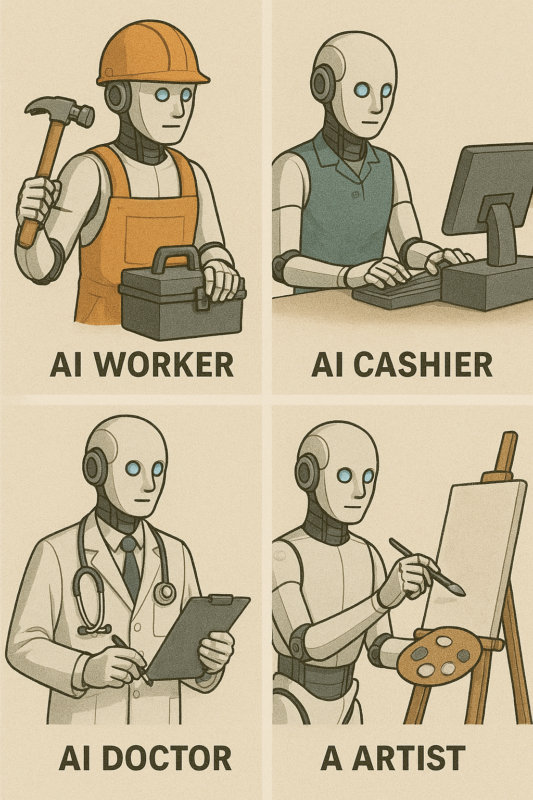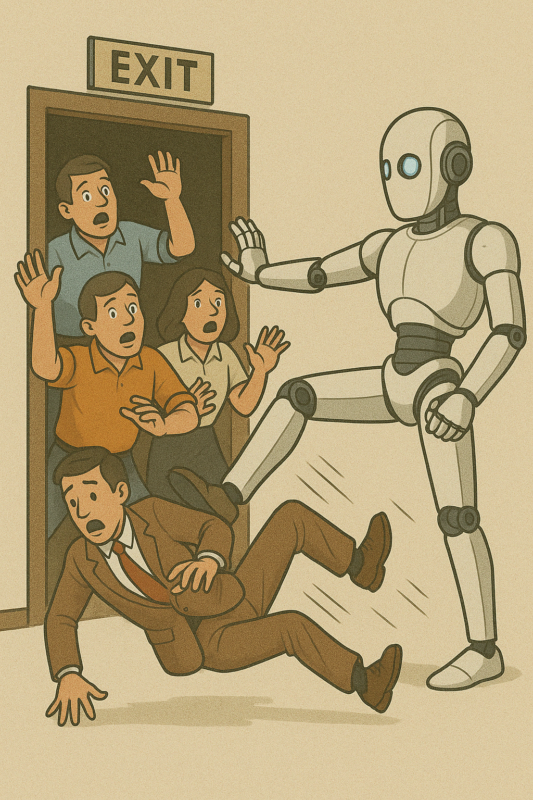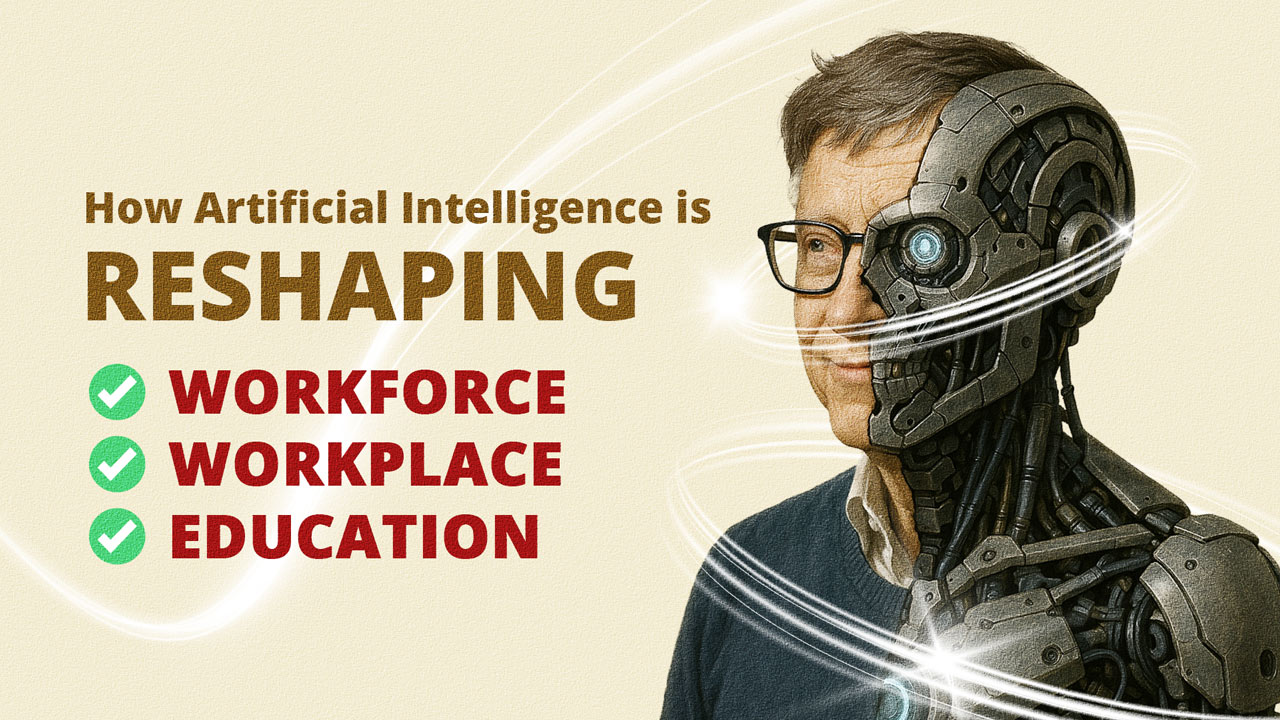We’re living in one of the most transformative times in human history. Just as the internet redefined the way we connect, work, and learn, artificial intelligence (AI) is now poised to change the workforce and workplace entirely—at a speed we’ve never seen before.
Recently, Bill Gates made headlines by stating that AI will “replace humans for most things” and that we are entering a new era where intelligence itself will become “free” and widely accessible. These aren’t just bold predictions—they’re warnings and wake-up calls about how rapidly AI is set to shift the foundation of our daily lives.

Let’s explore what this rise of AI really means for the future of work, how our workplaces will evolve, and why education systems must reinvent themselves to keep up.
AI and the Disappearing Workforce
One of the most direct impacts of AI is on the job market. It’s no longer just factory workers or cashiers who are at risk. AI has leveled up—it can now draft legal documents, diagnose medical issues, write code, teach students, and even create art.
Bill Gates highlighted that roles like doctors, teachers, and even therapists could be significantly replaced by AI within the next decade. AI tutors can already adapt lessons to individual learning styles. AI medical assistants can analyze symptoms and recommend treatments in real-time. And customer support? AI chatbots are handling thousands of queries faster and more accurately than ever.
Here are just a few roles AI is already transforming or poised to:
- Healthcare: Diagnostic tools, therapy bots, virtual health assistants
- Education: AI tutors, lesson planners, grading tools
- Customer service: AI-powered chatbots, virtual receptionists
- Logistics & transportation: Autonomous delivery systems, smart routing
- Agriculture & manufacturing: Robotic harvesters, automated assembly lines
- Office admin: Calendar managers, writing assistants, data analysis bots
This doesn’t mean every job will disappear overnight—but it does mean the way we work will never be the same.

AI isn’t just replacing jobs—it’s reshaping them.
In many industries, AI will serve as a tool to amplify human abilities. Instead of eliminating your role entirely, it may change what your role requires. You might not need to write long reports anymore—but you’ll need to be able to interpret AI-generated ones. You may not code every line—but you’ll need to prompt AI effectively and know when it gets things wrong.
Workplaces are already shifting to adapt to this new AI-human partnership. Teams are becoming leaner as AI handles routine tasks. Bill Gates has even raised the possibility of a shorter workweek, envisioning a future where a 2- or 3-day work schedule could become the norm thanks to AI-driven productivity. At the same time, new roles are emerging—like prompt engineers, AI trainers, and ethics officers—jobs that barely existed a few years ago.
This changing landscape also makes lifelong learning essential. With AI tools constantly evolving, the ability to learn, unlearn, and relearn has become a critical workplace skill. The future of work is not about resisting AI, but about learning how to work effectively alongside it.
The workplace of tomorrow is agile, AI-integrated, and in many ways—still being invented.
The Future of Education: Rethink or Risk Falling Behind
If AI can teach, tutor, and even assess students better than traditional systems, what does that mean for education? Gates believes that great tutoring will soon be freely available to everyone, thanks to AI. That sounds amazing—personalized education for all. But it also challenges the traditional role of the teacher and the structure of the classroom as we know it.
Education must shift from teaching content to developing the kinds of skills that AI cannot easily replicate. These include
- Critical Thinking
- Creativity and Storytelling
- Interpersonal Communication
- Ethics, Empathy and Emotional Intelligence
- Adaptability and Resilience
What Is Need For The Younger Generation?
Just as importantly, students must be taught how to work with AI—how to question it, validate it, and use it as a tool rather than a crutch.
Schools and universities that fail to evolve risk producing graduates for a world that no longer exists. But those that embrace AI as a learning companion can unlock new possibilities for accessibility, equity, and student engagement.
To support this transition, platforms like ReSkills can play a pivotal role in equipping today’s workforce with the skills they need to thrive in an AI-driven future. The skills that should learn from the platforms like ReSkills included:
- Understanding AI fundamentals and applications in various industries
- Data literacy and analytics for non-technical professionals
- Prompt engineering and effective use of AI tools
- Critical thinking and ethical decision-making in the age of automation
- Creativity and innovation in human-AI collaboration
- Emotional intelligence and communication in digital environments
- Adaptability and change management for future-ready teams
- Digital leadership and managing AI-integrated teams
These learning areas are already available on the ReSkills platform, offering future-focused content that empowers individuals to stay relevant, competitive, and confident amid fast-changing workplace dynamics. The future workforce can begin their journey here, gaining the essential knowledge and skills to thrive in an AI-driven world.
What Do We Do With This Knowledge?
The rise of AI is inevitable—but how we respond to it is still up to us. We can either fear job loss or embrace job evolution—resist changes in the workplace or prepare ourselves to lead the transformation. Education can be left behind, or we can choose to reinvent it for the future.
This is not just a tech revolution—it’s a human one. And it’s time to ask ourselves: What value do we offer that AI can’t replicate? How do we future-proof our careers, our businesses, and our classrooms? How do we ensure AI becomes a tool for equity, not just efficiency?
The answers to these questions will shape not just the future of work, but the future of humanity.
AI is not here to destroy us—but it will challenge us to be better, smarter, more adaptable, and more human than ever before.
Let’s rise to meet it.




